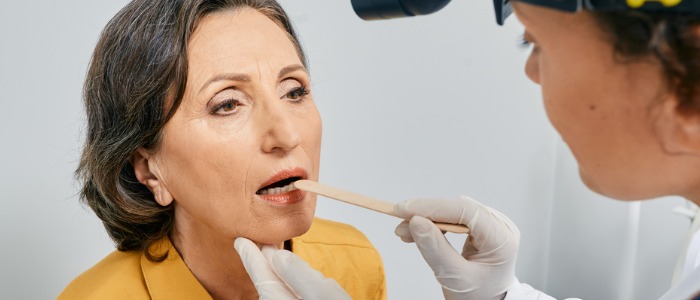Sore throat: the case for self care
In Services Development
Follow this topic
Bookmark
Record learning outcomes

According to the Self Care Forum, around half of the population will have at least one sore throat a year, and a fifth of these people will try to see their GP, often believing they need a course of antibiotics.
Yet sore throats are usually caused by viral infections, and four out of five cases will get better within seven to 14 days without the need for any medical treatment. In short, most people with an acute sore throat can manage their symptoms themselves with self care and over-the-counter products.
At this time of year, acute sore throats are usually caused by colds or ‘flu. However, Covid-19 has complicated the picture. Although the Government still cites the three main symptoms of Covid-19 as a fever, cough and loss of taste or smell, the Zoe Covid-19 study, which is supported by the Welsh and Scottish Governments, with data analysis provided by King’s College, London, reported in June that a sore throat is one of the most common symptoms of the delta variant.
If someone has a persistent severe sore throat with a very high temperature, swollen glands and extreme tiredness or exhaustion, and a negative Covid-19 PCR test, their GP may arrange for a blood test for glandular fever. The Epstein-Barr virus, which causes glandular fever, is responsible for up to one in 10 cases of sore throats, especially in teenagers.
A sore throat can also be triggered by allergies, chronic smoking, dry environments, acid reflux, coughing for long periods of time or clearing the throat regularly. However, these non-infective causes are less common than viruses or bacteria.
Symptom checker
A sore throat is a symptom, rather than a diagnosis. Most people use it in relation to three conditions – pharyngitis, tonsillitis and laryngitis.
Pharyngitis is triggered by inflammation at the back of the throat. It can cause:
- A painful throat, especially when swallowing
- A dry, scratchy throat
- Redness in the back of the mouth
- Bad breath
- A mild cough
- Swollen neck glands.
Tonsillitis affects the tonsils at the back of the throat – these may be red, sore and swollen. Bacterial tonsillitis can cause a very severe sore throat, with whitish pus on the tonsils, painful glands in the neck and a fever.
Laryngitis occurs when the larynx (voice box) is irritated, overused or inflamed. As well as causing a sore throat, it can lead to a hoarse, croaky voice or a complete loss of voice.
If the sore throat is caused by a viral infection, it may be accompanied by other symptoms, such as nasal congestion, a headache, fever and loss of appetite. According to the Self Care Forum and the NHS, most sore throats can be relieved by:
- Eating cool, soft food
- Drinking cool or warm drinks
- Sucking ice lollies or ice cubes
- Gargling with warm, salty water (adults only)
- Drinking plenty of fluids (preferably water) every day, especially with a fever
- Avoiding smoking and smoky environments as much as possible
- Resting as much as possible
- Taking painkillers such as paracetamol and ibuprofen
- Speaking as little as possible and keeping the air moist with bowls of water – talking loudly or whispering can both strain the voice.
There are many over-the-counter products available for sore throats, in various flavours and containing different active ingredients. According to National Institute for Health and Care Excellence (NICE) guidance in November 2018, medicated lozenges containing either a local anaesthetic, a non-steroidal anti-inflammatory drug (NSAID) or an antiseptic may help to ease the symptoms, although they may only reduce pain by a small amount.
The guidance states that there is no evidence that non-medicated lozenges, mouthwashes or local anaesthetic mouth sprays used on their own will help to ease the symptoms. However, many people do find that these products help to ease their sore throats, so pharmacy teams need to be guided by customer choice and preferences.
“Oral solutions containing glycerin can also be used to relieve symptoms,” says Ruth Giles, brand manager for Care at Thornton & Ross. “Glycerin acts as a moisturiser to soothe dry, scratchy throats. Sucking anything (lozenges, pastilles, or even boiled sweets) produces saliva, which helps to
lubricate and soothe and can also help to wash away any infecting organisms.”
Sore throats don’t usually cause complications, but certain red flags indicate that a customer should be referred to their GP. “Although a sore throat is most often associated with the common cold, it can also be a symptom of more serious conditions,” says Ms Giles. “Pharmacists need to be able to identify and refer anyone with a more severe issue, such as glandular fever, tonsillitis, oral thrush or an adverse drug reaction.”
Peritonsillar abscess (quinsy) is a complication of acute tonsillitis caused by an abscess (collection of pus) between the inflamed tonsil and the throat wall. Symptoms of quinsy include:
- A swelling inside the mouth and throat
- Difficulty opening the mouth
- Pain when swallowing
- Bad breath
- Earache on the affected side
- Difficulty breathing.
According to the NHS website, patients should seek medical advice if their sore throat is no better after one week or if they have frequent sore throats that don’t respond to analgesics. In particular, they should contact their GP or NHS111 if they have:
- A high fever (they should test for Covid-19 first)
- Severe throat pain that doesn’t respond to analgesics
- Voice changes (their voice becomes muffled)
- Difficulty drinking enough fluids, causing dehydration
- A weakened immune system (e.g. due to HIV/AIDS, diabetes or chemotherapy).
Patients should seek immediate medical advice if their symptoms are getting worse quickly, or if they are:
- Finding it hard to breathe or swallow
- Drooling (which can be a sign of not being able to swallow)
- Making a high-pitched sound as they breathe (this is called stridor).
Little evidence for antibiotics
According to the NICE guidance, there is little evidence that antibiotics make any difference to how long an acute sore throat lasts, even those caused by a bacterial infection. On average, antibiotics shorten the symptoms by only 16 hours.
When prescribing antibiotics for a sore throat, GPs (and pharmacist prescribers) need to take into account the fact that most sore throats don’t cause complications, and that antibiotics can cause side effects, especially diarrhoea and nausea. However, antibiotics may help when a sore throat is caused by group A streptococcal bacteria (GABHS), known as ‘strep throat’.

It is difficult to distinguish between a viral sore throat and a bacterial one based on symptoms alone. Throat swabs can help guide prescribing, but these involve taking a swab and sending it to a laboratory for testing. Given the time taken to get the results, throat swabs are not used routinely in primary care.
Unnecessary antibiotic prescribing, even in severe or long-lasting sore throats, contributes to global antimicrobial resistance. Some people may be offered a back-up antibiotic prescription instead, which they can use to get an antibiotic after a few days if they don’t feel any better or start to feel worse. The first-choice oral antibiotics are phenoxymethylpenicillin (taken for five to 10 days), clarithromycin or erythromycin (the preferred choice in pregnancy) for five days.
Another way to test for GABHS is with rapid antigen detection testing (RADT). Unlike throat swabs, RADT doesn’t need a laboratory and can provide an immediate test result. However, in November 2019 NICE concluded that GP usage of RADT along with clinical assessment was unlikely to be a cost-effective use of NHS resources.
Over the last few years, several pharmacy-based sore throat test and treat services have been established. Pharmacy customers answer a series of questions, have an on-the-spot RADT test and are prescribed antibiotics by the pharmacist without the need to see a GP, if the RADT test results are positive.
 In November 2018, an NHS-funded sore throat test and treat (STTT) service was introduced in Wales in selected pharmacies in two health board areas, as an extension to the Welsh national pharmacy common ailment scheme. In February 2020, a research study published in the BMJ Open journal evaluated the impact of STTT on the provision and quality of patient care, patient safety and GP consultation rates. It found that fewer than 20 per cent of 1,725 consultations resulted in antibiotic supply. The availability of STTT was associated with greater reductions in prescriptions for phenoxymethylpenicillin than in areas where STTT wasn’t available.
In November 2018, an NHS-funded sore throat test and treat (STTT) service was introduced in Wales in selected pharmacies in two health board areas, as an extension to the Welsh national pharmacy common ailment scheme. In February 2020, a research study published in the BMJ Open journal evaluated the impact of STTT on the provision and quality of patient care, patient safety and GP consultation rates. It found that fewer than 20 per cent of 1,725 consultations resulted in antibiotic supply. The availability of STTT was associated with greater reductions in prescriptions for phenoxymethylpenicillin than in areas where STTT wasn’t available.
In May 2021, researchers published a survey of 510 people who had accessed the Welsh STTT service. They found that 98 per cent said they were satisfied with the service, and, after using it, 99 per cent of respondents stated that they would return to a pharmacy for subsequent sore throat symptoms.
Many STTT services around the UK were suspended at the start of the pandemic, but these are slowly starting up again. “A pilot in Wales was restarted last year but in just two out of seven health boards and this didn’t involve having a test,” says Judy Thomas, director of contractor services at Community Pharmacy Wales. “People were asked questions on a list and given antibiotics if they ticked enough boxes. But this led to a rise in antibiotic prescribing.”
Recently, it was decided that the testing element of the Welsh service would be reintroduced, within Covid-19 guidelines to ensure that the pharmacy team wouldn’t be putting themselves at risk (eg with proof of a negative lateral flow test). “We expect the new sore throat test and treat services to be up and running, using all seven health boards, from the beginning of December 2021,” says Judy Thomas. “The pharmacies will need refresher training, which will be done online to begin with. It will be a soft launch initially, with letters going to GP practices in early 2022.”
Views of the P3pharmacy category panel
“We’ve seen a big increase in sales for sore throat products in the last year. We get queries about sore throat every day, especially in winter. It increased during the pandemic and now with increased colds around, it’s very popular. We get asked how to numb the pain and how to get rid of sore throat altogether. Manuka honey is a popular request, as well as Strepsils. Other good sellers are Strefen lozenges and Difflam throat spray. Have a variety of medicated and non-medicated products in store as there has been a big surge in interest for non-medicated products in the last year.”
Sarina Mughal, Day Lewis, Knightsbridge
“This is a really important area for us, especially in winter when there are so many viruses around. Customers ask what will give them immediate relief; they also ask if they might need an antibiotic, so we explain why this won’t help in most cases. Strepsils are still the brand leader, while Difflam throat spray is really popular as it numbs the pain. There are now lots of different flavours of lozenges available, with more brands on the market, and lots of generic throat sprays. Make your sore throat products readily available for customers to browse and access.”
Lila Thakerar, Shaftesbury Pharmacy, Harrow
“Last year we sold virtually no cough, cold or sore throat remedies as no one had colds, but this year there’s been a really bad sore throat and cough virus going around, so we’ve sold more throat remedies. Questions tend to be about how long the sore throat will last, and when to consult a GP. We offer an ENT service, so can examine their throat and I can prescribe if necessary. It’s important to promote this service if you offer it; patients won’t be aware you can examine them. Difflam throat spray sells really well. Jakeman’s and Strepsils are always good sellers.”
Lindsey Fairbrother, Goodlife Pharmacy, Hatton, Derbyshire
